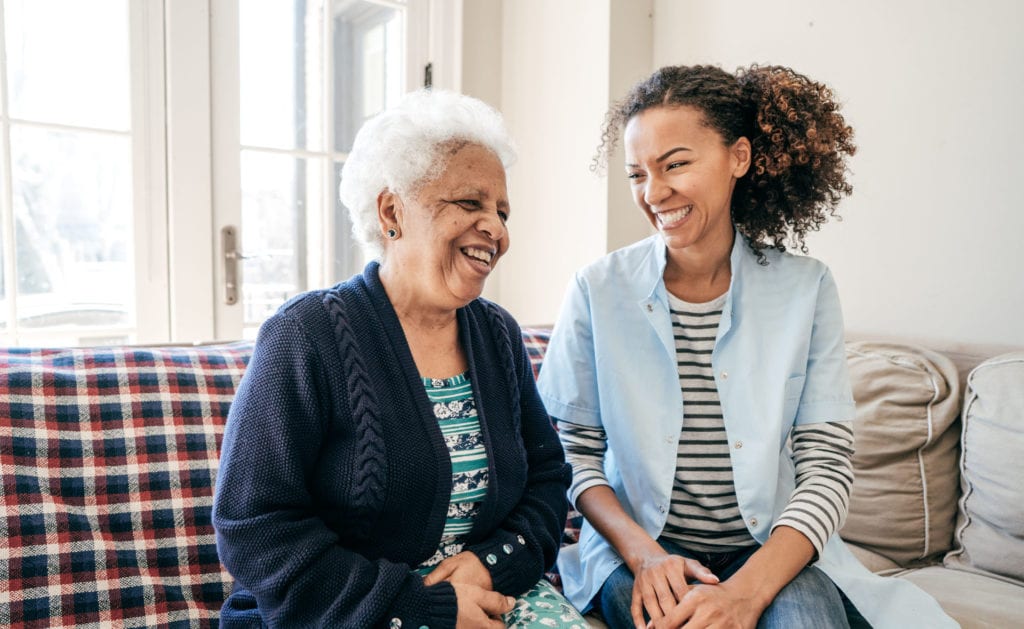Are you the sole caregiver for a loved one with Alzheimers or Dementia? You are not alone. The Alzheimer’s Association reports that over 16 million people in the United States alone care for someone struggling with memory loss. Caregiving for any elderly loved one presents its trials, but being the sole caregiver of a loved one experiencing memory loss brings forth a whole new set of challenges. As dementia takes away your loved one’s independence, you become their hands, feet, and mind.
As a caregiver, you might feel isolated and overwhelmed. Maybe you are mourning the loss of the loved one you once knew while giving 100% of yourself to the loved one who is experiencing the symptoms of dementia. Here are three ways to care for your loved one with dementia, while also taking care of yourself.
Accept The Help of Others
Accepting help or relief from others can be challenging. You might feel like your loved one is your responsibility, you don’t want others to be burdened, or you don’t want your loved one to feel as if they are a burden themselves. Feeling guilty or hesitant to accept help is a very common mindset for caregivers but an unhealthy one. Put these notions aside and embrace the help and support of others. Here are some ways you can seek out assistance whenever you are feeling overwhelmed:
- Join a local support group. Does your city have a support group for caregivers? Joining a local support group for caregivers will allow you to talk openly about caregiving, learn caregiving strategies, get more resources, and meet new friends who truly understand what you’re going through.
- When friends reach out, take their hand. Remember that your friends, family, or community members are offering to help because they love you and want to help you. No one is forcing them to offer assistance, and you are not a burden to them.
Caregiving is not easy. No matter how you have found yourself in a caregiving role, it is crucial you recognize that you will need a helping hand or someone to talk to along the way. Do not isolate yourself from others. Instead, try to embrace their support and friendship as you are caregiving for your loved one with dementia.
Empathize With Your Loved One
Caring for your loved one with dementia can present many frustrations. Maybe your loved one is experiencing hallucinations and is convinced that you are a spy who is out to get them. Or, perhaps they are refusing to eat a meal that was once their favorite. The most simple solution to dealing with hard moments like these is to operate by the golden rule. How would you feel if the roles were reversed?
Try to remember that the situations your loved one is experiencing are very real and troublesome for them. They are not purposefully trying to be annoying or dramatic. As someone without dementia, it can be challenging to place yourself in that situation. However, when your loved one is acting out or experiencing more intense symptoms of dementia, treat them with empathy and kindness. Remember that no matter how far gone your loved one seems, they are still present.
Prepare For The Future
When caregiving for a loved one with dementia, change is the only inevitable. There might be days where it seems like your loved one is symptom-free, and they are acting like their old self. There will also be days when they are acting like a stranger. Many caregivers find comfort in preparing for the future and knowing they are doing all they can to make their loved one’s life as comfortable and stress-free as possible. Here are some things you can do to prepare for their future:
- Prepare for the transition to professional memory care. If your loved one is currently living with you or at an assisted living facility, they will eventually need to transition to professional memory care. Research and identify dementia care options in your area, so you are ready to move when the time comes.
- Focus on financial planning. Professional memory care is often costly. As you are searching for care for your loved one, make sure to consider your budget. What can you afford? Planning ahead, financially, will save you a lot of stress down the road.
Do you have questions about assisted living or transitioning your loved one to a professional memory care facility? Contact Culpepper Place. We are here to help you during this time.






